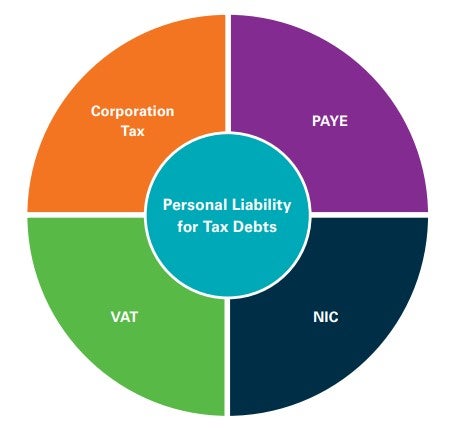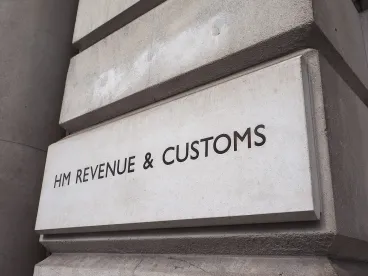
In certain circumstances, HM Revenue and Customs (HMRC) is able to “pierce the corporate veil” to make individuals personally liable for the tax debts of companies.
HMRC’s powers in this area were significantly strengthened by the Finance Act 2020. With effect from 22 July 2020, company directors, shadow directors, persons concerned in or taking part in the management of a company and participators can all be issued a “joint and several liability notice” (JSL notice) by HMRC. A JSL notice can be issued where HMRC is satisfied that it is “necessary for the protection of the revenue”, the company is subject to an insolvency procedure (or there is a serious possibility that it will become insolvent) and one of three scenarios applies. The new rules are discussed in more detail in our previous alert.
However, it is important to be aware that the new “joint and several liability for tax” rules in Finance Act 2020 are not the only rules that allow directors and other officers to be made personally liable for the unpaid taxes, and tax-related penalties, of a company. HMRC has numerous tools, under separate parts of the tax code, relating to different taxes, which enable it to collect a company’s unpaid tax debts from its officers. Equally important to note is that not all of these powers require the company to be insolvent or for there to be any deliberate avoidance action (or inaction).
This note briefly outlines the main circumstances in which directors can be held to be personally liable for the unpaid taxes of a company.
This note should not be relied on as legal advice. Should you require advice in relation to your own specific circumstances then please contact one of our team whose contact details are at the end of this guide.
Pay as You Earn (PAYE)
HMRC has the power to recover amounts of income tax, which has been under-deducted by an employer (under the PAYE rules), plus interest and penalties, directly from the employee (including directors and other office holders) to which the under-deduction relates.
Strictly, the power arises in two circumstances: first, where the employer took reasonable care to comply with PAYE and the failure to deduct the excess was due to an error made in good faith (in which case, recovery can be made from the employer or the employee); and, second, where HMRC considers the employee has received relevant payments knowing that the employer wilfully failed to deduct the amount of tax (in which case, recovery is made from the employee only).
However, following recent case law (in an area that continues to evolve), the courts have held that HMRC is entitled to exercise a wide discretion to disapply the PAYE rules altogether in circumstances where it considered it “unnecessary or not appropriate” to continue to pursue the employer company. This clearly widens the circumstances in which PAYE liabilities can be transferred to directors.
Additional rules apply in circumstances involving the employment of agency workers. In cases where a company does not deduct, account for or pay an amount of PAYE when it becomes due, HMRC is able to serve a personal liability notice (PLN) on one or more directors of the company requiring them to pay the PAYE debt (plus any interest) within 30 days. No fault or wilful failure is necessary. Where a PLN is issued to more than one director in respect of the same debt, the directors are jointly and severally liable to pay the PAYE amount.
National Insurance Contributions (NIC)
HMRC is also empowered to issue a PLN in circumstances where:
-
A body corporate has failed to pay NIC when due.
-
HMRC considers, on the balance of probabilities, the failure was due to fraud or neglect by officers (meaning, for these purposes, any director, manager, secretary (or other similar officer), or any person purporting to act as such) of the body corporate.
The broad definition of “officer” used for these purposes extends its scope to cover any individual who can be shown to have been acting as a shadow or de facto director, or performing a role and having duties normally associated with that of a director. Judging neglect in these circumstances requires applying an objective test; negligence will be found wherever there is an omission to do something that a reasonable person would do, or where something is done that a reasonable person would not do. That test could be satisfied simply by the failure to pay a NIC liability on time but HMRC has stated that the power will only be used where it believes the failure to pay NIC due was attributable to fraud or serious neglect. HMRC has published guidance that outlines certain factors that they consider to be indicators of more serious levels of neglect. The list includes situations where, at the time of the failure to pay NIC due, the company continued to make payments to other creditors or used the amounts due to fund the company activities and boost cash flow.
The PLN will require the relevant officer to pay the proportion of the NI debt (plus any interest and penalties) that, in HMRC’s opinion, reflects the officer’s culpability for the failure of the company to pay the NIC due. The NIC rules are much wider than those applying to PAYE. Crucially, the extended power of recovery for NIC applies to all of the body corporate’s NIC liabilities; it is not confined to the NIC liabilities attributable to payments made to the relevant officer.
Value Added Tax (VAT)
Other than for cases involving administrative dishonesty (for which see below), where a body corporate dishonestly acts (or omits to take action) for the purpose of evading VAT (including obtaining a credit, refund or repayment), it will be liable to a penalty equal to the amount of the VAT evaded (or sought to be evaded). Dishonesty must be shown objectively (that is, a reasonable person would consider the action to be dishonest) and subjectively (that is, the person knew, applying the standards of a reasonable person, the act would be considered to be dishonest).
However, where HMRC concludes, on the “balance of probabilities”, that the conduct (in whole or part) is attributable to the dishonesty of a director (or managing officer, again, broadly defined to mean any manager, secretary (or other similar officer) or any person purporting to act in any such capacity or as a director) of the body corporate, it is able to issue a notice transferring the body corporate’s liability to the director. The director, then, becomes personally liable for all (or part) of the VAT penalty, with the body corporate treated as having been discharged from liability.
In addition, although not a measure that can create personal liability for directors, HMRC has powers that can require a taxable person to provide security (in whatever form they specify) for such an amount as they deem necessary to protect an amount of VAT that is, or may become, due. HMRC has stated that it will only require security based on its estimate of the VAT that will go unpaid if a business does not pay its VAT.
The conditions that apply in security situations are lengthy but, in making its decision where the taxpayer is a body corporate, HMRC is able to assess the trading and VAT compliance history of any director. That said, the mere involvement of a director in the past with a company that became insolvent will not be relevant without an assessment of that person’s role and responsibility in that company’s failure. The power to require security for the protection of VAT revenue is extensive and, where applied, can severely hinder the ability of a company to continue trading as a going concern.
Corporation Tax
Non-UK Incorporated Companies
When it comes to taxes, everything that needs to be done by a company is treated as being done by the company acting through its “proper officer” (broadly, the company secretary or treasurer unless a liquidator or administrator has been appointed). HMRC is able to recover corporation tax due from any non-UK incorporated companies (and companies incorporated by Charter) directly from the proper officer of the company. The officer is, however, entitled to be reimbursed, and to be indemnified, by the company for the liability incurred.
Gains of UK Permanent Establishments and De-grouping Charges
In addition, where a non-UK resident company fails to pay UK tax (within six months) on gains realised from the disposal of assets of its UK permanent establishment, HMRC is able to recover the tax due from a controlling director of the non-UK company (or a controlling director of a company that had control of the non-UK company). HMRC can invoke the power by issuing a notice stating the amount of corporation tax due and requiring the controlling director to pay it within 30 days. The director is entitled to recover any amount paid from the non-UK company.
The same sort of power also applies to de-grouping charges (including, in particular, those relating to a previous intragroup transfer of intangible fixed assets and the “clawback” of stamp duty land tax (SDLT) group relief).
Company Migration Penalties
A company that ceases to be resident in the UK for tax purposes (e.g. where a non-UK incorporated company transfers its central management and control to another country) will be liable to UK tax on unrealised chargeable gains immediately before becoming a non-UK tax resident. This is a migration charge. The company has certain obligations to notify HMRC in advance of migrating and make arrangements to ensure its UK tax liabilities are paid. Failure to meet the obligation will result in a penalty, which could be an amount equal to the total tax due. The penalty can be imposed on any director of the company (or of a company that has control of the company) who knowingly does (or is party to) any act that resulted in the company ceasing to be UK resident.
Compliance and Administration
There is a single set of rules, applying to corporation tax, PAYE, NIC, VAT (alongside income tax, capital gains tax, deductions required under the construction industry scheme (CIS), SDLT, SDRT and others), that impose penalties on taxpayers that submit documents to HMRC containing an inaccuracy that results from the careless or deliberately dishonest behaviour by the taxpayer.
Where such penalties are payable by a company because of a deliberate inaccuracy, attributable to the behaviour of an officer of the company, HMRC can issue a written notice to the officer transferring the penalty (in whole or part) to that officer. Again, the meaning of officer is widely defined here to include any director, shadow director, manager, secretary, or any other person managing or purporting to manage any of the company’s affairs. The officer must pay the penalty within 30 days, although they are entitled to challenge the imposition, and amount, of the penalty, even where the company has chosen not to.
Similar rules apply in relation to a penalty imposed where a company fails, due to the deliberate misconduct of one or more of its officers, to meet its statutory obligations to notify HMRC of a liability to tax (including corporation tax, VAT, diverted profits tax, digital services tax, income tax, capital gains tax and others).





 />i
/>i

